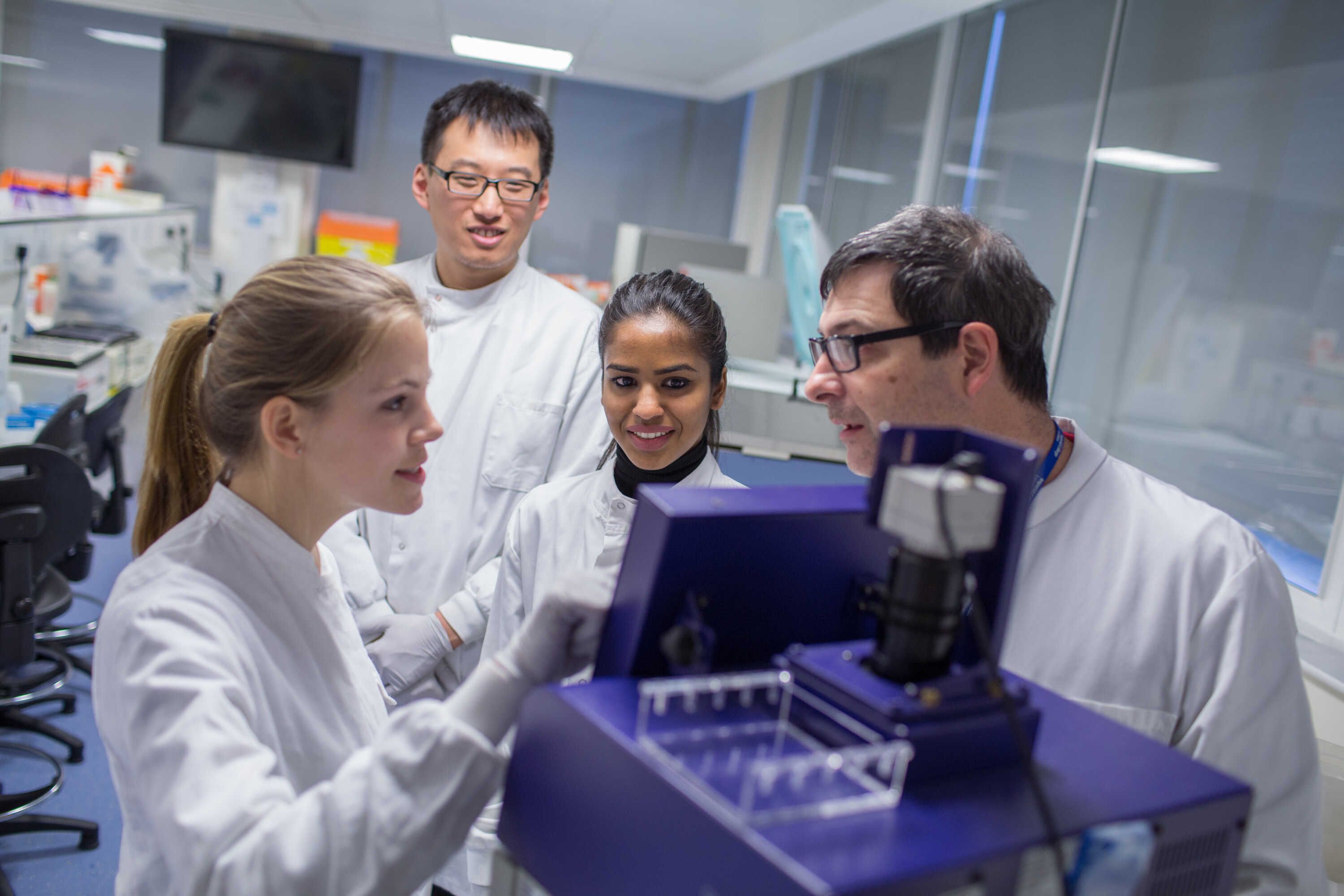
Human Molecular Genetics
Train in the theory and application of human genetics to prepare for a research career.
Train in the theory and application of human genetics to prepare for a research career
Gain hands-on experience in the field through intensive laboratory work and computer practicals
Develop your skills on a full-time research project exploring an area of genetics study
Course key facts
-
Qualification
-
MSc
-
-
Duration
1 year
-
Start date
September 2025
-
Study mode
Full-time
-
Fees
£15,500 Home
£45,000 Overseas
-
Delivered by
-
Location
-
Hammersmith
-
Minimum entry standard
-
2:1 in biochemical sciences, genetics or another science-based subject
Course overview
Train in the theory and application of human genetics to prepare for a research career on this Master's course
You'll develop expertise in molecular genetics, human health and disease research and receive a broad theoretical and applied grounding in human genetics.
The programme of study also explores recent advances in the field, and will develop your practical laboratory and computer skills relating to bioinformatics and genomics.
You'll also apply your knowledge on a six-month novel research project designed to assess your critical understanding of topics covered on the course.
Structure
This page is updated regularly to reflect the latest version of the curriculum. However, this information is subject to change.
Find out more about potential course changes.
Please note: it may not always be possible to take specific combinations of modules due to timetabling conflicts. For confirmation, please check with the relevant department.
You’ll take all of these core modules.
Core modules
Become familiar with key aspects of molecular genetics and reinforce your knowledge of cell biology, gene regulation, mechanisms of disease, and human genetics.
Understand how Mendel’s law of inheritance applies to both rare and common disease and contrast the implications of different modes of inheritance.
Discover how to pose a testable hypothesis, implement a hypothesis test, and understand simple statistical tests.
Learn how to operate safely in a laboratory setting, use laboratory equipment, set up and perform molecular genetics experiments, and interpret results.
Build your research skills on a six-month novel project in one of our participating laboratories, with input from two supervisors.
You'll implement, critically assimilate and extend all that you have learned during the programme, with work assessed by a thesis and oral examination.
Teaching and assessment
Teaching and learning methods
-
Lectures
-
Study groups
-
Practical laboratory classes
-
Virtual learning environment
-
BL-embedded Qualitrics surveys
-
Field trips
-
Research project
-
Lecture recordings
-
Placement
-
Tutorials
-
Workshops
Balance of assessment
Key
- Taught modules
- Research project
- 50% Taught modules
- 50% Research project
Assessment methods
-
Online exercises
-
Essays
-
Journal clubs
-
Lab performance
-
Oral examination
-
Peer formative assessment methods
-
Presentations
-
Research dissertation
-
Study groups
-
Tutorial discussions
-
Written examination
Entry requirements
We consider all applicants on an individual basis, welcoming students from all over the world.
How to apply
Apply online
You can submit one application form per year of entry. You can choose up to two courses.
There is no application fee for MRes courses, Postgraduate Certificates, Postgraduate Diplomas, or courses such as PhDs and EngDs.
If you are applying for a taught Master’s course, you will need to pay an application fee before submitting your application.
The fee applies per application and not per course.
- £80 for all taught Master's applications, excluding those to the Imperial College Business School.
- £100 for all MSc applications to the Imperial College Business School.
- £150 for all MBA applications to the Imperial College Business School.
If you are facing financial hardship and are unable to pay the application fee, we encourage you to apply for our application fee waiver.
Find out more about how to apply for a Master's course, including references and personal statements.
An ATAS certificate is not required for students applying for this course.
Tuition fees
Home fee
2025 entry
£15,500
You should expect and budget for your fees to increase each year.
Your fee is based on the year you enter the university, not your year of study. This means that if you repeat a year or resume your studies after an interruption, your fees will only increase by the amount linked to inflation.
Find out more about our tuition fees payment terms, including how inflationary increases are applied to your tuition fees in subsequent years of study.
Whether you pay the Home or Overseas fee depends on your fee status. This is assessed based on UK Government legislation and includes things like where you live and your nationality or residency status. Find out how we assess your fee status.
If you're a UK national, or EU national with settled or pre-settled status under the EU Settlement Scheme, you may be able to apply for a Postgraduate Master’s Loan from the UK government, if you meet certain criteria.
For courses starting on or after 1 August 2024, the maximum amount is £12,471.
The loan is not means-tested and you can choose whether to put it towards your tuition fees or living costs.
Overseas fee
2025 entry
£45,000
You should expect and budget for your fees to increase each year.
Your fee is based on the year you enter the university, not your year of study. This means that if you repeat a year or resume your studies after an interruption, your fees will only increase by the amount linked to inflation.
Find out more about our tuition fees payment terms, including how inflationary increases are applied to your tuition fees in subsequent years of study.
Whether you pay the Home or Overseas fee depends on your fee status. This is assessed based on UK Government legislation and includes things like where you live and your nationality or residency status. Find out how we assess your fee status.
If you're a UK national, or EU national with settled or pre-settled status under the EU Settlement Scheme, you may be able to apply for a Postgraduate Master’s Loan from the UK government, if you meet certain criteria.
For courses starting on or after 1 August 2024, the maximum amount is £12,471.
The loan is not means-tested and you can choose whether to put it towards your tuition fees or living costs.
Scholarships
The Dean’s Master’s Scholarships
Value per award
- £10,000
Who it's for
- All students applying to study a Faculty of Medicine Master’s course
The Dr Jean Alero Thomas Scholarships
Value per award
- Partial or full tuition fee at the Home rate
Who it's for
- All students applying to study a Faculty of Medicine lab-based Master’s course
Department of Metabolism, Digestion and Reproduction Bursaries
Value per award
- £2,000 (full-time) or £1,000 per year (part-time, two-years)
Who it's for
- Offer holders for the department's MSc/MRes courses
How will studying at Imperial help my career?
Gain transferable skills relevant to further studies in human molecular genetics or a career in medicine.
These include scientific written and presentational communication skills.
Our graduates often pursue further study in master's programs or doctoral research.
Up to 50% of students go on to do a PhD.
Approximately 25% become research assistants or associates.
Others enter industry or pursue further education in bioinformatics and computing.
The NHS typically hires one or two clinical genetics students every year for training positions.
Further links
Contact the department
- Telephone: +44 (0)20 7594 6515
- Email: deborah.jones@imperial.ac.uk
Course Director: Dr Toby Andrew
Visit the Department of Metabolism, Digestion and Reproduction website.

Register your interest
Stay up to date on news, events, scholarship opportunities and information related to this course.

Events, tasters and talks
Meet us and find out more about studying at Imperial.

Terms and conditions
There are some important pieces of information you should be aware of when applying to Imperial. These include key information about your tuition fees, funding, visas, accommodation and more.
You can find further information about your course, including degree classifications, regulations, progression and awards in the programme specification for your course.
Programme specifications